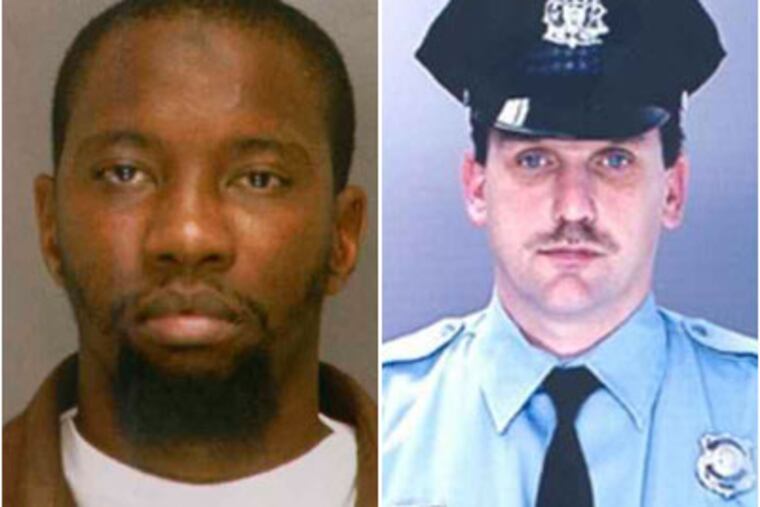Man accused in officer's death slugs his lawyer
For years, Philadelphia lawyer William L. Bowe has represented people most lawyers will not: accused killers, often with long criminal records and short tempers, some of them on what seems like a fast track to death row.

For years, Philadelphia lawyer William L. Bowe has represented people most lawyers will not: accused killers, often with long criminal records and short tempers, some of them on what seems like a fast track to death row.
It's the kind of job that might make some lawyers ask for combat pay. In Bowe's case, literally.
On Wednesday - for the second time in seven months - Bowe was assaulted in court by a client, this time Eric DeShann Floyd, one of two men on trial for murder in the 2008 shooting of Police Sgt. Stephen Liczbinski.
Wednesday's attack happened after two days of disruptions of jury selection by Floyd, who has openly argued with Common Pleas Court Judge Renee Cardwell Hughes about her refusal to grant his last-minute request to fire his lawyers and represent himself.
By Tuesday, after Floyd publicly interrupted questioning of a prospective juror, Hughes told him he would watch the rest of the trial in a holding cell via closed-circuit television.
On Wednesday, the judge ordered Floyd back into court to see whether he had changed his mind about behaving. When Floyd said no and Hughes ordered him removed, Floyd swung and punched Bowe behind an ear.
As Bowe slumped to the side, Floyd hit the lawyer again in the back of the head as sheriff's deputies wrestled him away and took him from the courtroom.
Bowe tried to walk from the courtroom with help but was persuaded by paramedics to be moved by stretcher to an ambulance. He was taken to Thomas Jefferson University Hospital for examination and released.
Floyd's action again postponed jury selection, this time to Friday, when prosecution and defense lawyers - including Bowe - return.
"Mr. Bowe is tired, but he will be in good health when we resume this case on Friday," the judge announced in a brief return to the bench.
Common Pleas Court President Judge Pamela Pryor Dembe said such incidents are always possible in the criminal court system. She said she was pleased that sheriff's deputies subdued Floyd so quickly.
"By and large, when you consider how many unhappy and how many violent people are brought into our courtrooms, and that includes nondefendants as well, it's amazing we don't see this type of thing more often," Dembe said.
As word spread that a lawyer, and specifically Bowe, had been assaulted, colleagues stopped by the third-floor courtroom at the Criminal Justice Center.
Criminal defense lawyer Guy R. Sciolla called Bowe "the consummate professional," whom he has known since the early 1970s, when Bowe was a public defender and he was a city prosecutor.
"I think every lawyer thinks about something like this happening," Sciolla said, adding, "If he [Floyd] is going to do this to Bill Bowe, he would have done it to anybody."
The fact that Bowe will continue representing Floyd shows his professionalism, Sciolla said.
Bowe, 63, has been a fixture of the Center City legal community for decades. Standing well over six feet, with a head of mussed gray hair and a thick mustache, he is soft-spoken and reticent in public, almost a casting director's choice for "country lawyer."
Bowe is cordial, but never comments to reporters. Nor would he Wednesday as he was wheeled to the ambulance.
In recent years, colleagues say, Bowe's solo practice has been limited almost exclusively to murder and death-penalty cases.
Outside court, he has taught trial advocacy at Temple University's law school and conducted professional seminars about death-penalty law.
His last physical encounter with a client was in November, when he was punched out by Eric Arms, 29, moments after a Philadelphia jury convicted Arms of third-degree murder. Arms was sentenced to 18 to 45 years in prison for the murder. He has yet to be tried for assaulting Bowe.
Floyd - short and muscular to Bowe's tall and lanky - is expected to be charged with assault in Wednesday's incident after the current murder trial.
He has a record of arrests for robbery, including a 1994 case in which he pleaded guilty and was sentenced to one to five years in prison.
Floyd, of North Philadelphia, and co-defendant Levon T. Warner, 41, of West Philadelphia, face the possibility of the death penalty if the jury finds them guilty of first-degree murder.
Floyd and Warner are accused of taking part in the May 3, 2008, bank robbery and chase that ended in Port Richmond with Liczbinski, who had been pursuing them, dead of gunshot wounds.
Howard Cain, 33, alleged leader of the group who police say shot the 12-year veteran officer, was killed by police after the three split up and he ran off.
Jury selection in Floyd's and Warner's trial began Monday and Floyd began interrupting the proceedings, demanding the right to fire Bowe, who he said "rubbed me the wrong way."
Floyd complained that Bowe and co-counsel Earl G. Kauffman were not asking questions or raising pretrial issues that he thought were important.
Still, Floyd's disruptions were only vocal. Until Wednesday.